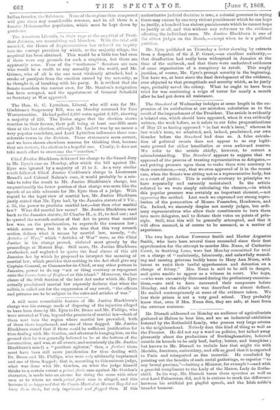Chief Justice Blackburn delivered his charge to the Grand Jury
in Mr. Eyre's case on Monday, after which the bill against Air. Eyre was ignored by a majority of 21 to 2. As a very similar result followed Chief Justice Cockburn's charge in Lieutenant Brand's and Colonel Nelson's case, it would probably be a mis- take to refer the result to Mr. Justice Blackburn's charge, but unquestionably the latter portion of that charge was more like the speech of an able advocate for Mr. Eyre than of a judge. With regard to the legal view of martial law, Air. Justice Blackburn justly stated that Mr. Eyre had, by the Jamaica statute of 9 Vic., c. 35, the power to proclaim martial law,—but then what martial law? What did martial law mean? Mr. Justice Blackburn went back to the Jamaica statute, 33 Charles II., c. 21, to find out ; and he quoted the seventh section of that Act to prove that martial law was, on the proclamation, to supersede the common law ; which seems true, but it is also true that this very seventh section defines what it means by martial law, namely, "the Articles of War," which "Articles of War" were, as the Chief Justice in his charge proved, violated most grossly by the proceedings at Moraut Bay. Still more, Mr. Justice Blackburn overlooked, and neglected to quote the final clause of this old Jamaica Act by which he proposed to interpret the meaning of martial law, which provides that nothing in the Act shall give any Captain-General, or Commander-in-Chief, or any other persons in Jamaica, power to do any "act or thing contrary or repugnant unto the known laws of England or this island." Moreover, the last clause of the 98th Section of the later Act under which Mr. Eyre actually proclaimed martial law expressly declares that when the militia is called out for the suppression of any revolt, " the officers and privates are to be subject to the rules and articles of war."


































 Previous page
Previous page